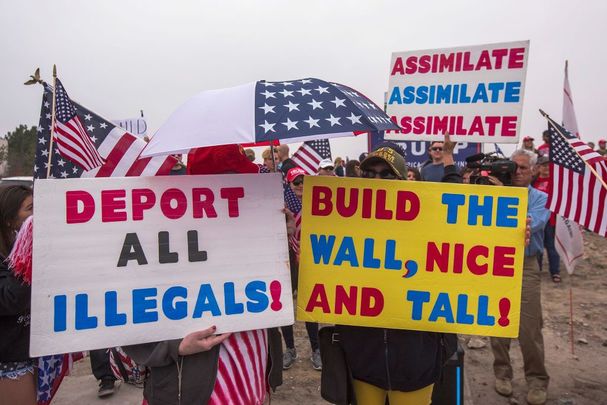I first set foot in the United States on a J1 visa in the summer of 1999.
But it was a girl who persuaded me to make the full time move in September 2004. We were married in 2005 and the plan was to move back to Cork in 2006-2007.
The crash in the housing market meant that we never made the move back home, as the home we bought for $222,500, plummeted to $75,000.
America has always been the land of immigrants. In the schools, it is described as a melting pot of cultures that assimilate into one. Without the Irish and others, many of the cities as we know them would never have come to be.
Yet things have changed.
The country of hope, dreams, and opportunity that so welcomed people from all over the world through Ellis Island has been replaced by a country bitterly divided. Political opinion has never been more polarized than it is today in the United States.
Attitudes to immigrants have changed too. There is suspicion and paranoia in Trump's America that scares many newcomers

Ellis Island.
Read more: Annie Moore was the first immigrant through Ellis Island in 1892

The division is worse under Trump. Image: Getty.
As soon as I got married, I was frequently asked when I would become a US citizen.
I loved American politics and having studied it in depth at college back home, I wasn’t short of my opinions. It was always assumed by those around me that every international resident wants to become an American.
Yet I always struggled with the idea as I longed for home, and always thought that next year would be the year. I am Irish and nothing makes me prouder. How could I dilute that?
What is it like being an immigrant abroad? You live with the reality that your phone could ring at any time, calling for you to rush home to Ireland for an emergency. You miss birthdays and christenings and weddings and family gatherings, and you live them through phone calls and FaceTime.

Social media makes it easier to keep in touch. Image: Getty.
For me, the struggle to make it home is financial. For the undocumented, they have no choice. They knew of their sacrifices when stepping onto the plane in Shannon or Dublin, yet it still jars at the soul.
Adapting to life in the United States can be straight forward from a conventional sense. The internet, phones, shops, and television make the world a smaller place.
Yet there are times when culturally you feel that you will never be fully accepted as one of them. I will always be an Irishman, an outsider. And when I return home, I often feel like a foreigner who moved away and never came back.
As a result, the emigrant can often feel lost, homeless and striving for identity.
I am Irish. I will always be Irish. My heart will always be in Ireland.
I know that others see things differently. To them, I have become the “Yank.” I struggled for years when people have asked me why I had not become an American citizen.
Read more: How to apply for Irish citizenship

I am now both an Irish and a US citizen. Image: Getty.
I truly love my homeland and never want to dilute this. The struggle to renounce my homeland while making the oath was always going to be a struggle, but this was counterbalanced by the ability to have dual citizenship.
People pointed out that DeValera compromised when taking the Oath of Allegiance and if it was good enough for Dev, it should be good enough for me.
Even though I had a permanent residency, a culture of fear has developed in this country and a reality that nothing appears permanent anymore. The time has come to protect the ones I love.
The time has come to be able to have a say in the future shape of the United States, and not just for me, but for the thousands of Irish who have never had that opportunity.
I became a US citizen in July.
I will always be Irish, but now like my wife and three children, I will be American as well.
Are you an Irish immigrant who became an American citizen? Tell us your story in the comments section, below.




Comments